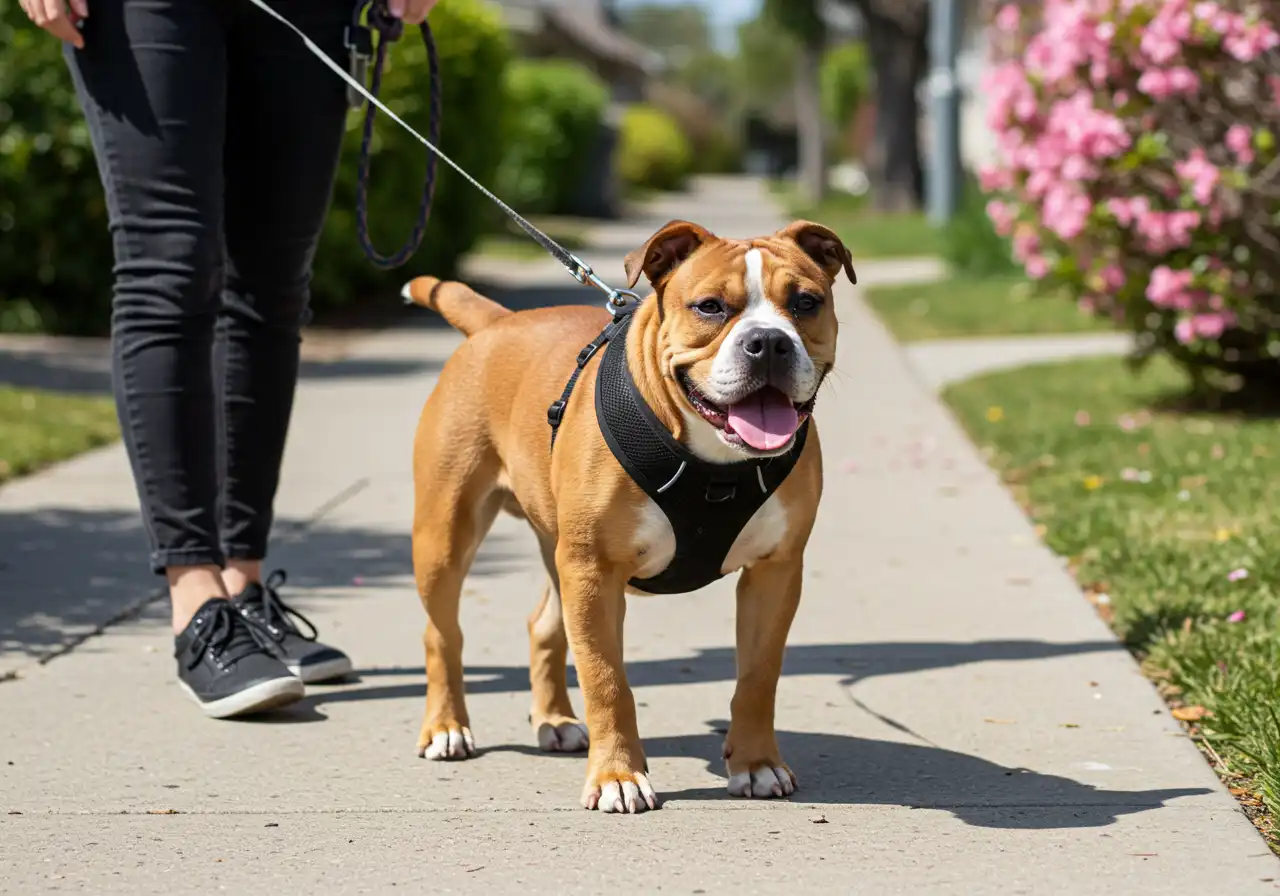Continental Bulldogs are medium-sized, athletic bulldogs that originated in Switzerland. They were developed by breeder Imelda Angehrn in the early 2000s to address health and physical issues found in traditional English Bulldogs. Known for their affectionate and balanced temperament, Continental Bulldogs make suitable family pets with moderate energy levels.
Selecting a responsible breeder is crucial for the well-being of both the puppy and the breed as a whole. Responsible breeders prioritize health, temperament, and genetic diversity, ensuring that their puppies grow into healthy adults with stable temperaments. They follow ethical breeding practices and comply with animal welfare laws.
Key takeaway: This article will guide you through the process of choosing a responsible Continental Bulldog breeder. We will highlight key factors to consider and provide practical tips to help you make an informed decision. This guidance will ensure that you bring home a healthy, well-adjusted Continental Bulldog puppy that will be a cherished member of your family.
Understanding the Continental Bulldog Breed
Origin and Development of the Continental Bulldog in Switzerland
The Continental Bulldog, often referred to as the Conti, is a relatively new breed that originated in Switzerland. Developed in the early 2000s by breeder Imelda Angehrn, the breed was created with the goal of addressing the health and physical issues commonly found in traditional English Bulldogs. By selectively breeding healthier and more resilient dogs, Angehrn aimed to produce a companion dog that complies with European animal protection laws and exhibits fewer health problems.
Physical Traits and Size Specifics
Continental Bulldogs are medium-sized, athletic dogs with a smooth coat. They typically weigh between 20-30 kg (50-66 pounds) and stand about 16-19 inches tall at the shoulder. Distinguishing features include:
- A well-muscled body: These dogs have a robust build that reflects their strength and stamina.
- Less extreme brachycephalic features: Compared to English Bulldogs, Contis have shorter noses, which helps reduce respiratory issues.
- Compact, athletic frame: Their balanced proportions make them agile and active.
Temperament Traits
Continental Bulldogs are known for their affectionate and balanced temperament, making them ideal family pets. Key temperament traits include:
- Affectionate: They form strong bonds with their families and enjoy spending time with their human companions.
- Balanced: Contis exhibit a stable temperament, being neither overly aggressive nor excessively timid.
- Moderate energy levels: While they enjoy playtime and regular exercise, they also appreciate downtime and can adapt to various living environments.
These characteristics make Continental Bulldogs well-suited for families seeking a loyal, loving, and moderately energetic pet.
The Importance of Choosing a Responsible Breeder
Selecting a responsible breeder is not just about finding a puppy—it’s about safeguarding the well-being of your future dog and supporting ethical breeding practices that benefit the breed as a whole. The choices breeders make directly impact puppy health, temperament, and quality of life for years to come.
Impact of Breeder Practices on Puppy Health and Temperament
Breeders who prioritize health and ethical standards invest in proper genetic screening, thorough veterinary care, and early socialization. These steps reduce the likelihood of common issues such as hip dysplasia, skin allergies, or eye problems. Puppies raised in clean environments with regular human interaction are more likely to display stable temperaments—traits that cannot be guaranteed by breeders who cut corners.
Poorly bred Continental Bulldogs often face:
- Unstable temperaments (fearfulness, aggression)
- Chronic health issues (untreated genetic conditions)
- Poor socialization skills due to limited human contact
Risks Associated with Irresponsible Breeding
Irresponsible breeding practices—such as ignoring health screenings or prioritizing profit over animal welfare—lead to several preventable problems:
- Genetic Disorders: Without proper testing, inherited conditions like hip dysplasia or entropion become prevalent in litters.
- Behavioral Problems: Puppies from high-volume breeders or puppy mills often lack early socialization, increasing the risk of anxiety and reactivity.
- Shortened Lifespan: Chronic health issues can decrease both the quality and length of life.
Long-Term Benefits of Ethical Breeders
Choosing an ethical breeder comes with clear advantages:
- Puppies enjoy better baseline health through proactive vet care and screening.
- Stable, predictable temperament traits thanks to the careful pairing of parents.
- Ongoing support for new owners—reputable breeders act as resources long after you bring your puppy home.
Responsible breeding ensures your Continental Bulldog has the healthiest possible start, shaping a positive future for both your family and the breed itself.

Key Health Considerations for Continental Bulldogs and How Responsible Breeders Address Them
Continental Bulldogs, while generally healthier than their English Bulldog relatives, have their share of breed-specific health risks. If you’re learning how to choose a responsible Continental Bulldog breeder, understanding these common issues—and what a good breeder does to prevent them—can help you make the right decision.
Common Health Issues in Continental Bulldogs
- Hip Dysplasia: This genetic joint disorder can lead to pain and mobility issues as dogs age. While less prevalent in Continentals than some other bulldog breeds, it still appears with concerning frequency in poorly bred lines.
- Eye Conditions: Problems like cherry eye and entropion are not unusual. Without proper screening and early intervention, these conditions may require surgical correction and ongoing care.
- Skin Allergies and Dermatitis: Due to their skin folds, Continental Bulldogs can develop allergies and infections if not managed correctly or bred from healthy stock.
- Respiratory Health: Though the breed was developed with less extreme brachycephalic features, some individuals may still experience mild breathing difficulties during hot weather or intense exercise.
The Role of Genetic Screening and Health Testing
Responsible breeders rely on genetic screening to minimize inherited health issues. This includes:
- PennHIP or OFA testing for hip dysplasia
- Eye exams by veterinary ophthalmologists
- Screening breeding dogs for skin problems, allergies, and other heritable diseases
Breeders provide documented results of these tests as part of the puppy’s health record. You should always request to see this paperwork before making any commitments.
How Responsible Breeders Safeguard Puppy Health
A reputable breeder’s practices go beyond basic veterinary care:
- They select breeding pairs based on clear genetic health histories—not just appearance or temperament.
- Puppies receive early vet checks, up-to-date vaccinations, parasite prevention, and microchipping before leaving for new homes.
- Diet recommendations, exercise guidelines, and ongoing support are standard offerings from dedicated breeders.
These steps reduce the risk of chronic health problems and equip new owners with the tools needed for long-term canine wellness. Responsible breeders set clear expectations about potential health needs so that you know what caring for a Continental Bulldog involves from day one.
Identifying a Responsible Continental Bulldog Breeder: Key Factors to Consider
Transparency About Lineage and History
Pedigree information is crucial for anyone serious about the health and temperament of their future Continental Bulldog. A responsible breeder provides clear and detailed records of the puppy’s lineage, allowing you to make informed decisions about potential risks tied to inherited conditions.
Predicting Health and Temperament Traits
The lineage of a Continental Bulldog gives direct insight into the likelihood of genetic diseases, physical traits, and behavioral tendencies.
- Families with histories free from chronic issues like hip dysplasia or hereditary eye conditions offer a higher chance that your puppy will enjoy robust health.
- Puppies bred from dogs with stable, affectionate temperaments are more likely to display those same qualities, making them suitable companions for families or individuals seeking a reliable pet.
What Transparency Looks Like
Expect breeders to provide official pedigree documentation tracing back several generations. These records should include details such as:
- Registered names and registration numbers
- Health test results (e.g., hip scores, eye exam certifications)
- Titles or achievements in conformation or working events
- Notations of any known genetic diseases or concerns within the line
Transparency is not limited to paperwork. Responsible breeders are often eager to discuss the strengths and weaknesses of their dogs’ family trees. They can speak candidly about their breeding choices, what traits they prioritize, and what steps they take to minimize inherited problems.
Verifying Lineage Information
Double-check the information provided by consulting reputable breed registries or clubs. In Europe, organizations such as the Fédération Cynologique Internationale (FCI) maintain databases for pedigree verification.
- Ask for access to public registry databases where you can independently verify parentage and health testing claims.
- Breed clubs dedicated specifically to Continental Bulldogs may also keep records of approved breeders, litters, and recommended practices.
Red Flags
Breeders who hesitate to share full pedigree information or whose paperwork appears incomplete should be approached with caution.
- Vague answers about ancestry or reluctance to disclose health test results may signal a lack of transparency or possible gaps in responsible breeding practices.
A straightforward approach to sharing lineage and providing verifiable documentation sets apart trustworthy breeders. This level of openness not only builds trust but also demonstrates a genuine commitment to preserving the Continental Bulldog’s well-being across generations.
Ethical breeders view transparency as non-negotiable—ensuring every buyer understands both the promise and potential challenges connected with each puppy’s heritage. This is your foundation for making an informed choice that prioritizes long-term health and compatibility.
In addition, responsible breeders often adhere to best practices in canine breeding that significantly enhance the health outcomes for the puppies. These practices are not just beneficial but essential in reducing the risk of genetic disorders in dogs.

Ethical Breeding Practices That Reflect a Commitment to the Breed’s Welfare
Responsible Continental Bulldog breeders operate within strict ethical breeding standards that prioritize the health, temperament, and well-being of every dog. These breeders adhere to animal welfare laws—such as European animal protection regulations—that set clear requirements for living conditions, veterinary care, and breeding frequency.
Key practices include:
- Comprehensive Health Tests: Reputable breeders conduct health screenings on all breeding stock before any mating occurs. Typical tests include:
- Hip dysplasia evaluations using established protocols like OFA or FCI scoring.
- Eye exams that are performed by veterinary ophthalmologists to detect hereditary conditions.
- Screening for other genetic diseases relevant to the breed’s history.
- Transparent Documentation: You should expect clear, organized records from any breeder who truly values ethical breeding. These records should detail:
Pedigree information and lineage transparency for both parents.
Copies of health clearances or certificates for each health test performed.
Veterinary records showing up-to-date vaccinations and checkups.
- Prevention of Overbreeding: Ethical breeders limit the number of litters per female and maintain small-scale operations. This approach avoids the pitfalls of puppy mills, where profit is prioritized over the welfare of dogs.
- Commitment Beyond Sale: A responsible breeder will provide ongoing support and be available for questions throughout your dog’s life—an indicator that their concern extends far beyond the initial transaction.
Ask to see all health clearances, and don’t hesitate to verify credentials through official clubs or veterinary databases. Consistent transparency is a hallmark of breeders who are invested in the future of Continental Bulldogs.
Ethical breeding practices protect not just individual puppies but also strengthen the breed as a whole with healthier, happier dogs that thrive in family environments.
Selecting Suitable Homes for Puppies: A Sign of a Responsible Breeder’s Dedication to Their Dogs’ Future Happiness
A reputable Continental Bulldog breeder invests as much effort in choosing the right homes for their puppies as they do in health tests and genetic disease screening. The goal is to match each puppy’s temperament, energy level, and needs with a family that can provide lifelong care and stability.
Key practices responsible breeders use to evaluate potential owners:
- In-depth interviews: Expect questions about your daily routine, family structure, previous dog experience, work hours, and living environment. This helps breeders assess whether you understand the breed’s needs and have realistic expectations.
- Home visits or virtual tours: Some breeders may request to see where the puppy will live. This ensures a safe, clean setting and verifies that hazards are minimized.
- Puppy placement criteria: Breeders consider personality traits, such as matching more active or independent puppies with suitable families. They may refuse sales if they feel the fit is not ideal for either party.
Responsible breeders also provide full transparency by sharing health clearances—such as hip dysplasia tests and eye exam results—for both parents. You should expect documentation verifying screenings for common genetic diseases. Access to pedigree information and lineage transparency further demonstrates a breeder’s commitment to healthy, well-adjusted dogs.
By prioritizing both health documentation and careful puppy placement, responsible breeders help ensure that Continental Bulldogs thrive in their new homes.
Questions to Ask Potential Breeders: Gathering Information for an Informed Decision-Making Process
When selecting a Continental Bulldog breeder, asking the right questions is crucial to ensure you’re making an informed decision. Here’s a breeder’s questions checklist to help you assess the breeder’s reputation and practices:
Health Guarantees
- Do you provide health guarantees for your puppies?
- What specific health screenings have been performed on the parents (e.g., hip dysplasia, eye conditions)?
- Can you provide documentation of genetic testing?
Socialization Practices
- How do you socialize your puppies before they go to their new homes?
- Are the puppies exposed to different environments, people, and other animals?
- What steps do you take to ensure the puppies develop well-rounded temperaments?
Early Training Methods
- What kind of early training do the puppies receive?
- Do you use positive reinforcement techniques?
- Have the puppies been introduced to basic commands and crate training?
Vaccination Schedules
- Are the puppies up-to-date on vaccinations before they are rehomed?
- Can you provide a vaccination record and schedule for future vaccinations?
- Are the puppies dewormed and given preventive treatments?
These questions not only help you gauge the breeder’s dedication to their dogs’ well-being but also give insight into the level of care and preparation your potential puppy has received.
The Role of Early Socialization and Training in Puppy Development: What Responsible Breeders Want You to Know
Puppy socialization is a cornerstone of healthy behavioral development for Continental Bulldogs. Responsible breeders understand that the first few weeks of a puppy’s life are critical for shaping a stable, confident temperament. Puppies exposed early to a variety of sights, sounds, people, and gentle handling are less likely to develop fear-based behaviors or anxiety as adults. For families searching for sources on how to choose a responsible continental bulldog breeder, prioritizing breeders who emphasize structured socialization practices gives your future companion the best possible start.
Key aspects that responsible breeders focus on include:
- Exposure to Everyday Life: Puppies are gradually introduced to household noises, different surfaces, children, and other pets.
- Gentle Handling: Regular human interaction helps reduce sensitivity to touch and prepares puppies for routine care like grooming and vet visits.
- Early Play and Exploration: Supervised play with littermates fosters bite inhibition, communication skills, and resilience.
Training methods matter just as much as socialization. Ethical breeders advocate for positive reinforcement techniques—rewarding desired behaviors with treats, praise, or play. This approach builds trust and encourages puppies to learn without fear or intimidation. Harsh corrections or outdated dominance-based methods are discouraged because they can damage the bond between dog and owner and hinder learning. A breeder’s commitment to positive training reflects their investment in each puppy’s long-term well-being and adaptability.

Grooming Needs and Daily Care Requirements Communicated by Reputable Breeders: Setting Realistic Expectations as a Future Owner
Grooming needs for a Continental Bulldog are manageable, but consistency is key to maintaining health and comfort. Reputable breeders outline these routines clearly:
- Coat care: The breed’s short, smooth coat requires brushing two to three times per week. This helps remove loose hair and keeps the coat shiny. Brushing also distributes skin oils and reduces shedding in the home.
- Skin fold cleaning: Regular cleaning of facial folds is essential for preventing irritation or infection—a common concern in bulldog breeds. Breeders recommend using a gentle, damp cloth several times a week, always drying thoroughly afterward.
- Bathing: Occasional baths—usually every month or when dirty—are enough. Gentle dog shampoos help avoid skin dryness.
- Nail trimming, ear checks, and dental hygiene: Routine nail trims prevent discomfort. Ears should be checked weekly for signs of redness or wax buildup. Teeth brushing several times per week supports dental health.
Daily exercise requirements are another priority breeders discuss with future owners:
- Continental Bulldogs thrive on about an hour of daily activity. Walks, moderate play sessions, and mental enrichment prevent obesity and support their muscular build.
- Heat sensitivity should be respected. Activity is best scheduled during cooler parts of the day to avoid overheating.
Responsible breeders set clear expectations about these daily responsibilities to help owners prepare for a healthy and happy life with their Continental Bulldog.
Verifying Breeder Reputation Through Reviews and References: Ensuring Peace of Mind Before Bringing Home Your New Best Friend
A breeder’s reputation provides a window into their ethics, professionalism, and the real-life experiences of families who have brought home Continental Bulldogs from their litters. Leveraging breeder reviews can save you from future frustrations and help you avoid unethical practices.
1. Testimonials from Previous Buyers
Seek out detailed feedback from individuals who have already purchased puppies from the breeder you’re considering. Look for specifics about the health, temperament, and adaptability of their dogs. Honest reviews often mention ongoing support after the sale—a mark of breeders who genuinely care about their puppies’ futures.
2. References from Veterinary Professionals
Veterinarians who have treated multiple dogs from a particular breeder can offer unbiased insights into the general health and behavior of that breeder’s lines. A reputable Continental Bulldog breeder should be willing to connect you with veterinary references.
3. Breed Clubs and Associations
Organizations such as national or regional Continental Bulldog clubs typically maintain lists of approved or recommended breeders. These clubs set standards for ethical breeding and require members to follow codes of conduct that prioritize health, temperament, and responsible placement.
“When I reached out to our local Continental Bulldog club, they provided references and connections to owners in my area. Hearing their honest experiences made my decision much easier.”
Reliable sources of breeder reviews include breed-specific forums, social media groups dedicated to Continental Bulldogs, and independent review sites focused on dog breeding. Taking the time to research these channels helps ensure you find a breeder whose reputation matches your expectations for transparency and care.
Conclusion
Choosing a responsible Continental Bulldog breeder is essential for ensuring the health and well-being of your new puppy. Prioritizing health and ethics over convenience or cost can make a significant difference in maintaining breed standards.
- Health Screening: Look for breeders who conduct genetic tests to minimize health risks.
- Transparency: Ensure they provide clear information about lineage and history.
- Ethical Practices: Confirm adherence to animal welfare laws and avoidance of overbreeding.
- Home Selection: Choose breeders who carefully evaluate potential owners.
By following these guidelines, you contribute positively towards the breed’s future while securing a happy, healthy companion.

